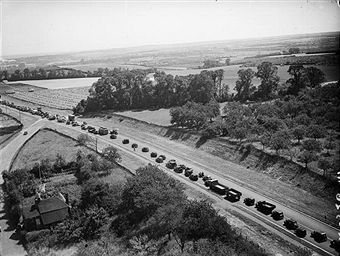This year’s other Royal Wedding
Coffee House congratulations to Zara Phillips and Mike Tindall, who were married in Edinburgh today. Footage via ConservativeHome:
Coffee House congratulations to Zara Phillips and Mike Tindall, who were married in Edinburgh today. Footage via ConservativeHome:
The Spectator is very proud to be the purveyor of a long-distance birthday message to Prince Philip, who turned 90 yesterday, from some of his most devoted admirers: the tribe that actually worship him as a god. The cult of Philip began in the 50s when islanders on Tanna in the South Pacific noticed how devoted colonial officials were to the Queen. If she’s so great, then her husband must be awesome they (understandably) concluded. Four years ago, six Philip worshippers from Tanna — Chief Yappa, JJ, Joel, Albi and Posen — were brought over here to make make a TV documentary. For various reasons they stayed with me for
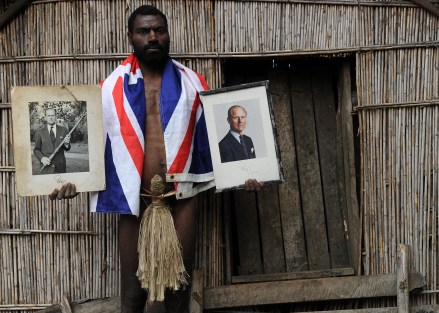
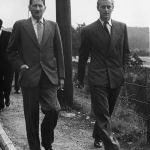
Prince Philip’s childhood was such that he had every right to be emotionally repressed and psychologically disturbed. Prince Philip’s childhood was such that he had every right to be emotionally repressed and psychologically disturbed. Born sixth in line to the Greek throne, at the age of 18 months he was hounded from what, in name at least, was his homeland. His father came within an ace of being executed for high treason. When he was only eight his mother suffered a devastating nervous breakdown; in 1930 she was drugged into placidity, bundled into a car and consigned to a sanatorium-cum-prison. His father shrugged off his responsibilities towards his children, of
A lovely picture of Her Majesty with the Obamas. Captions please! (Also, what joke is Prince Philip keeping to himself?) Meanwhile, I’ve a piece on Obamamania at the Daily Beast and a grumpy take on the “Special Relationship” at Foreign Policy.
On Sunday, it will be thirteen years to the day since the people of Northern Ireland voted in a referendum on the Good Friday Agreement. The result was one of overwhelming support: 71 per cent to 29. Here is Bruce Anderson’s take on the Agreement from his Politics column at the time: Mr Blair was rough on Mr Ahern (and while Unionists were there), Bruce Anderson, The Spectator, 18 April 1998 Occasionally, one is glad to be wrong. In this column last week, I wrote about the imminent collapse of the Ulster peace process. It seemed then as if everything was unravelling; the gaps between the various sides
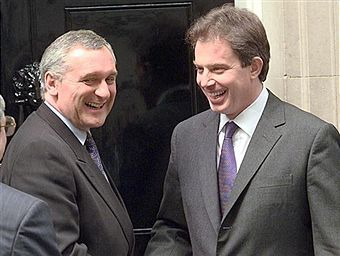
At the state dinner at Dublin Castle this evening is rather good. As you would expect from HMQ it says all the right things and does so modestly and without fanfare. Especially this bit: Of course, the relationship has not always been straightforward; nor has the record over the centuries been entirely benign. It is a sad and regrettable reality that through history our islands have experienced more than their fair share of heartache, turbulence and loss. These events have touched us all, many of us personally, and are a painful legacy. We can never forget those who have died or been injured, and their families. To all those who
On reflection, perhaps I’ve been a little too quick to discount the historical significance of the Queen’s visit to Ireland this week. Like so much else, it’s a question of perspective. If you’re 80 years old and a citizen of the Irish Republic, perhaps the sight of the Irish President greeting and welcoming the British monarch on equal terms would seem quietly moving and even a cause of some pride. I might think that this was what it was all about and I might see the visit as another confirmation that the Irish state has taken its rightful place in the community of nations. That’s been true for many years,
On 17 May 1974 — 37 years ago today — I was a 19-year-old student at Trinity College Dublin, celebrating the end of term in the Pavilion Bar near the sports fields. The summer exams were still to come, but we were carefree; the main subject of conversation was whether we could organise a disco party later on. Then, a little after 5.30 p.m., everything changed. First, all about us seemed to shiver, as if there were an earth tremor. Then, just as it occurred to me that Dublin did not generally suffer tectonic stress, there was a deafening bang that seemed to go on for an age. Somebody shouted:
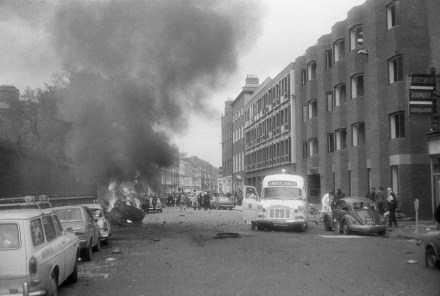
Pete is right to say there’s a definite “resonance” to these pictures. Nevertheless, I suspect that British people’s view of the “historic” significance of Her Majesty the Queen’s visit to the Republic of Ireland is inversely proportionate to one’s experience of Ireland. That is, the more time you have spent in Ireland and the better you know the country the less you are likely to swoon at the sight of a British monarch setting foot in southern Ireland. Perhaps I’m extrapolating too much from my own experience and perhaps the over-40s think differently. But my impression strengthened, to be sure, by some of the breathless, hyperbolic BBC coverage is that
There is something incredibly resonant about the images of the Queen arriving in the Republic of Ireland this afternoon. You have probably heard the facts by now — that she is the first British monarch to do so for 100 years, and the first since Irish independence — but they are no less striking. Against a backdrop of terror threats and of Britain’s participation in the country’s bailout, Queen Elizabeth II is making some kind of history today. It is also, as Ed West says in a thoughtful post over at the Telegraph, a time for remembrance. He suggests that we remember the 300,000 Irishmen who fought in the Great
So we’ve seen the ceremony at Westminster Abbey. How was the Royal Wedding celebrated – by expats and locals alike – around the world? In Afghanistan, British troops celebrated with bunting on the front line. In Australia, foods associated with the ‘Mother Country’ flew off supermarket shelves, with the biggest sellers being Maynards wine gums and Colman’s classic mint sauce. Even Aussie republicans appear to have been inspired to hold parties and wear tiaras. In China, a couple recently had a knock-off Royal Wedding, complete with horse-drawn carriage and archway of swords. And cashing in perhaps on the wedding fervour, McDonald’s in Hong Kong started offering wedding party packages. India
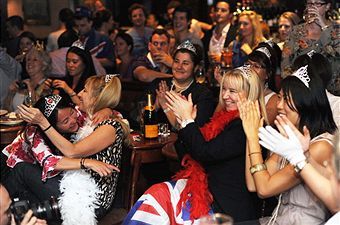

Perhaps it’s the pageantry of the occasion, but it does feel like one of those days for looking back as well as forward. In which case, we’ll have a double dose of Royal Wedding-related archive posts today, of which this is the first. And what a doozy it is, too: The Spectator’s editorial on the wedding of the Queen to Prince Philip in 1947. So many of its observations and exultations might equally apply today. “The spirit of egalitarianism is in the air,” it notes, “To that even royalty may have in some degree to adapt itself.” The adaptation, you feel, is still being written by those gathered in Westminster
This, it has to be said, is not much of a day for politics. Although the world’s laser-like attention will be focussed on Westminster, it will not be on the operations of our Parliament or its actors, but on Westminster Abbey and the marriage, of course, of Prince William and Kate Middleton. The cameras might pass for a moment over David Cameron, or Ed Miliband, or Nick Clegg. But even their best morning suits will not compete, you fancy, with the collected fascinators and finery on display — let alone with the wedding dress itself. We shall be marking proceedings on Coffee House with video, with archive posts and with
I know, I know, it’s deeply unromantic to anticipate tomorrow’s Royal Wedding through the prism of opinion polling. But as no one ever said that a political blog has to be romantic — and as there are some quite noteworthy findings among all the data — we thought we’d put together a quick round-up for CoffeeHousers. So here goes: 1) The guest list. There has, I’m sure you’ve noticed, been quite some hubbub over the fact the Gordon Brown and Tony Blair haven’t been invited to the wedding — especially in view of the Syrian ambassador’s invitation, since withdrawn. But some new polling from YouGov — highlighted by PoliticsHome —

It was, I’m sure CoffeeHousers noticed, the Queen’s 85th Birthday yesterday. So here, as a belated commemoration, is an item from the archives that is a even more archival than usual. You see, it’s an article that was written on the event of the Queen’s 80th Birthday in 2006 — and it looks back at the issue of The Spectator that was published when the Queen was actually born, in 1926. Mary Wakefield, our deputy editor, is the author: The week the Queen was born, Mary Wakefield, The Spectator, 8 April 2006 It was press day at The Spectator when Queen Elizabeth II was born. The printers had set the
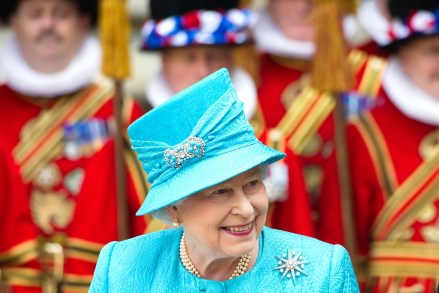
Meanwhile, elsewhere in whimsy the nice folks at Foreign Policy asked me to write a piece about Prince William’s engagement. Somehow this ended up with another modest proposal: the United States should ditch the Presidency, join the Commonwealth and become a parliamentary democracy. You know, like Canada. They have the trappings of royalty already, but none of the benefits: Last year, Peggy Noonan, the American conservative commentator and former presidential speechwriter, complained that President Barack Obama lacked some of the presence that a good head of state requires. She imagines “a good president as sitting at the big desk and reaching out with his long arms and holding on to
Monday is the August Bank Holiday – at least in England and Wales, where it is the last weekend before the schools go back. In Scotland, the schools break up earlier (traditionally, so the kids could join in the work of lifting potatoes in the fields) but have already gone back. The August Bank Holiday is just one of eight permanent bank holidays in England and Wales (along with New Year, Good Friday and Easter Monday, the Early May Bank Holiday, the Spring Bank Holiday in late May, Christmas Day and Boxing Day). In Scotland there are nine – an extra day at New Year and St Andrew’s Day to
